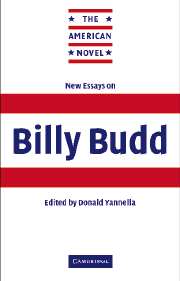Book contents
- Frontmatter
- Contents
- Series Editor's Preface
- List of illustrations
- Notes on contributors
- Introduction
- 1 Billy Budd and American labor unrest: the case for striking back
- 2 Religion, myth, and meaning in the art of Billy Budd, Sailor
- 3 Old man Melville: the rose and the cross
- 4 Melville's indirection: Billy Budd, the genetic text, and “the deadly space between”
- Select bibliography
- Index
4 - Melville's indirection: Billy Budd, the genetic text, and “the deadly space between”
Published online by Cambridge University Press: 02 December 2009
- Frontmatter
- Contents
- Series Editor's Preface
- List of illustrations
- Notes on contributors
- Introduction
- 1 Billy Budd and American labor unrest: the case for striking back
- 2 Religion, myth, and meaning in the art of Billy Budd, Sailor
- 3 Old man Melville: the rose and the cross
- 4 Melville's indirection: Billy Budd, the genetic text, and “the deadly space between”
- Select bibliography
- Index
Summary
While assembling officers for a drumhead court, Captain Vere includes a marine and “perhaps deviated from general custom.” The marine's “judicious” and “thoughtful” attributes make him “not altogether incapable of grappling with a difficult case.” Vere, however, is “not without some latent misgiving.” An “extremely good-natured man,” the marine is “an enjoyer of his dinner, a sound sleeper, and inclined to obesity.” A late pencil patch added to the fair-copy inscription further qualifies his character: “though he would always maintain his manhood in battle [he] might not prove altogether reliable in a moral dilemma involving aught of the tragic.” The immediate impression of Vere's approbation dissolves: To be “not altogether incapable” makes one not quite capable. Perhaps Vere has grounds for reservation. But then again, one wonders, why is Vere, conservative champion of “forms, measured forms” (Chap. 27, leaf 333), deviating from custom in the first place?
This revised passage signals the critical complexities attending Billy Budd, especially insofar as it depicts competing claims to interpretive authority. The narrator may be presenting Vere's prescient distrust of his supposed coadjudicators or his invidious tendency toward narrow self-righteousness. Is Captain Vere the just and sane man he believes himself to be, “no lover of authority for mere authority's sake,” one loathe to monopolize “the perils of moral responsibility” (Chap. 21, leaf 244)?
- Type
- Chapter
- Information
- New Essays on Billy Budd , pp. 114 - 144Publisher: Cambridge University PressPrint publication year: 2002
- 23
- Cited by



